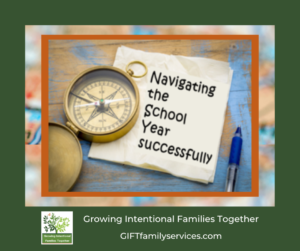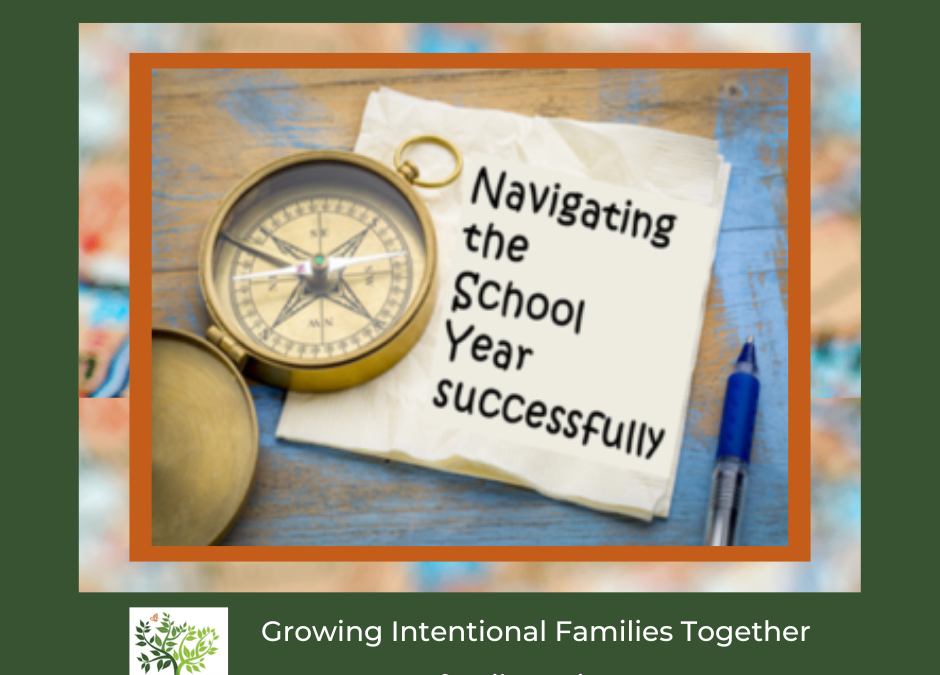 Schools have already reopened in my community which reminds me of the need for intentionality in how we guide our children through the school year. Parents and students all hope for a good year, one that is filled with learning–both academic and relational–and grows their ability to be in the driver’s seat of their lives. (After all, the point of parenting is to put ourselves out of a job: to raise kids that can succeed on their own.) So, how do we accomplish this vital goal? Operating purely on intuition is not enough; we need a plan–a map–that shows the route we intend to take.
Schools have already reopened in my community which reminds me of the need for intentionality in how we guide our children through the school year. Parents and students all hope for a good year, one that is filled with learning–both academic and relational–and grows their ability to be in the driver’s seat of their lives. (After all, the point of parenting is to put ourselves out of a job: to raise kids that can succeed on their own.) So, how do we accomplish this vital goal? Operating purely on intuition is not enough; we need a plan–a map–that shows the route we intend to take.
To design any functional map, we must know two facts: the departure point and the destination. The shortest route would simply draw a straight line from point A to point B. But life is never that linear, that free from unexpected obstacles and delays. We must plan for contingencies, pack supplies for “emergencies”, and draw out alternate routes “just in case.” What landmarks (benchmarks) do we want our kids to achieve? Keep in mind that our actions make a broader impact than our words. “Do as I say, not as I do,” never works. Our actions must reflect and embody our words and expectations. Make a list of possible goals.
We must exemplify whatever is on our “wish” list. This provides the model and the proof of our commitment to it. What behaviors do we wish to see? How do we encourage/reinforce these behaviors when our children demonstrate them? How are we modeling the same behaviors? How do we extinguish undesirable behaviors? Remember the distinction between discipline and consequences. The first aims to teach; the second aims to punish.
What skills do our children want to develop?
It’s important that they participate in goal-defining and setting. This is an important mindset and is a skill that benefits from practice. Clarity helps to focus their choices and it strengthens their commitment and desire. We must validate and understand their goals, dreams, and motivations, then discern how we can help them define, refine, and accomplish them.
What skills and habits do we want them to develop?
- Timeliness
- Getting themselves up in the morning
- Completing homework
- Putting forth full effort
- Learning from their mistakes
- Playing a sport
- Being physically active
- Managing tech time
- Expanding their circle of friends
- Being compassionate
- Helping others
- Showing respect for teachers
- Creating a school/play balance
- Being accountable
- Admitting errors
- Speaking up for themselves
- Asking for help and support
- Identifying their personal strengths as well as growth points
- Seeing school as a tool that helps them accomplish their life goals
What values do we want them to embrace?
- Confidence, competence, courage, resilience,
- persistence, compassion, service, open-mindedness,
- curiosity, conviction, self-discipline, delayed gratification,
- emotional balance, joy, conscience, morality, humor,
- awareness, creativity, forgiveness of others and self,
- respect for self and others, truth-telling and truth-seeking
What habits do we want them to internalize?
- Good nutrition,
- Adequate rest,
- Recreation
- Make time for self-reflection
Exercise
When we demonstrate intentionality about our personal and family goals we show our children not only that planning is essential for success but also we prove it is a priority for us, it’s part of our approach to goal accomplishment. It also reduces the chaos of living with a seat-of-the-pants, handling brush fires as they come. Having a life blueprint alerts us to digressions that lure us off track; we can then decide if it is a welcome diversion or a distraction we choose to avoid. It’s important to note that our expectations may get “in the way” if they are not developmentally ready to achieve at the level we would like them to be. Staying “attuned” and in communication with our kids at all times is our ultimate goal. We must nurture the child before us and not expect him to be the embodiment of a “fantasy child.” that exists only in our imagination.
- Call us at 1-800-653-9445
- Listen to our podcasts: Adoption Matters: Real People. Real Life. Real Talk and Essentials of Adoption Attuned Parenting
- Watch our YouTube channel
- Read Books written by our coaches
- Click to learn more about Adoption Attuned Certified coaching!



